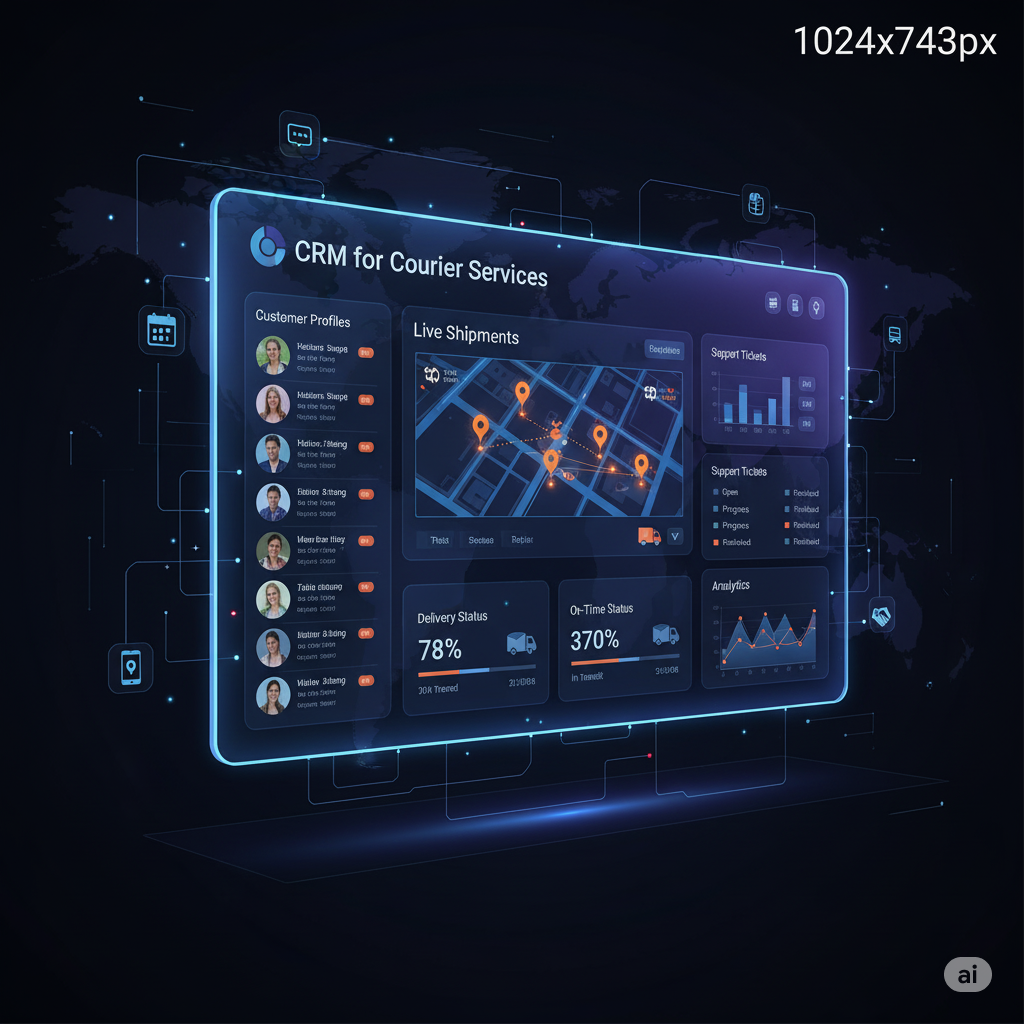The courier sector is one of the fastest-growing industries globally today. With millions of packages being delivered daily within cities and countries, courier businesses are confronted with the mounting need for improved communication, tracking, and customer satisfaction. This is where courier services step in. A CRM (Customer Relationship Management) system is not only a sales tool anymore — it’s an entire business management platform. For courier businesses, it automates customer handling, streamlines operations, and enhances overall delivery experience.
What Is CRM for Courier Services?
CRM for courier services is a dedicated software system for courier and logistics businesses to manage customers, shipments, and team operations all in one platform. In contrast to conventional CRMs that concentrate solely on sales and leads, courier CRM systems are designed to address the distinctive concerns of delivery companies — including proof of delivery, pickup requests, shipment tracking, and agent performance. The objective is straightforward: to offer quick, precise, and customized courier service to all customers without compromising operations efficiency.
Key Features of a Courier CRM System
A properly designed CRM for courier companies has strong capabilities specific to delivery management. Some of the most effective ones are: 1. Customer Database Management Keep all the customer data — names, addresses, contact numbers, and preferences — in a single organized system. This allows teams to easily access customer history and provide customized support. 2. Shipment Tracking Real-time tracking of shipments is perhaps the most crucial tool in courier business. A courier CRM provides customers and employees with an idea of where a package is at any given time, promoting openness and reliability. 3. Automatic Notifications The system may automatically send SMS or email notifications regarding pickups, dispatches, and deliveries. It informs customers and cuts down on service calls. 4. Lead and Inquiry Management For courier companies dealing with fresh customer leads or corporate clients, the CRM efficiently tracks inquiries, assigns follow-ups, and converts them into customers. 5. Billing and Invoicing Built-in billing modules allow you to create invoices on the spot, process payments, and monitor pending balances — all from one dashboard. 6. Performance Analytics The courier service CRM offers reports of delivery time, agent productivity, and customer satisfaction levels, enabling managers to make informed decisions.
Advantages of Adopting CRM for Courier Service
Adoption of CRM for courier service has a number of business benefits — both operational and customer-oriented. 1. Improved Customer Communication Customers desire instant information regarding their packages. CRM software does this automatically, and they will be sent timely SMS or email notifications for each phase of the delivery process. 2. Centralized Operations Rather than switching between spreadsheets or various apps, all of it — customer information, delivery history, payments — remains within a single platform. This eliminates confusion and saves time. 3. Increased Efficiency With automated tracking and scheduling, workers can concentrate on deliveries rather than paperwork. This results in quicker service and more contented customers. 4. Increased Customer Retention A courier service CRM fosters trust by providing transparency and regular communication. Smoothly served customers return and refer your courier service more often. 5. Scalability for Growth Your business grows, and the courier CRM system grows along with you. Adding new branches, delivery personnel, and customer records is a breeze without sacrificing speed or data. 6. Faster Problem Resolution With all customer and shipment data instantly at hand, support teams can easily resolve complaints, track down missing packages, and address issues in a professional manner.
Why Courier Businesses Require a Custom CRM for Courier Services
Each courier business has unique workflows — from local delivery to international shipping. A custom CRM for courier services lets you customize features to your unique operations. For instance:
- If your business deals with international courier services, you may introduce customs clearance or overseas tracking modules.
- If you deal with domestic or same-day deliveries, you can have real-time route optimization and driver performance functionalities.
- If you deal in corporate logistics, the CRM can have contract management and auto-billing features.
A tailor-made courier CRM develops along with your business and takes care of everything in the background, right from bookings to billing.
CRM Integration for Courier Tools
Current CRM software seamlessly integrates with any tools your courier business already employs. Some popular integrations are:
- GPS tracking solutions – to reflect parcel status in real time.
- Email & SMS gateways – for automated delivery updates.
- Accounting software – such as QuickBooks or Tally for financials.
- E-commerce sites – for automated fetching of delivery orders.
- With all these integrations, your CRM for courier services becomes the hub of all the courier operations, ensuring accuracy and workflow.
CRM for Delivery Drivers and Agents
A courier CRM is not only for managers; it benefits delivery agents as well. With a mobile app that is connected to the CRM, drivers can:
- See assigned pickups and delivery addresses.
- Immediately update the status of packages (picked up, in transit, delivered).
- Capture evidence of delivery using photo or digital signature.
- Recover optimized routes to save time and fuel.
- This makes the whole delivery process more transparent and efficient, lessening manual paperwork and delays.
How CRM for Courier Services Improves Customer Experience
Customers form the core of any courier service. When they book a parcel, they expect two things: visibility and speed. CRM software for courier businesses enhances both. It provides live updates, provides tracking links, and even enables customer feedback directly via the system. These little touches instill trust and loyalty. Furthermore, when something goes wrong — such as delays or wrong addresses — the CRM enables your customer service team to respond quicker with correct information.
Steps to Implement CRM for Courier Services
- Assess your business requirements – Determine what issues you want to address (tracking, billing, leads, etc.).
- Select the appropriate CRM vendor – Find a system designed for logistics or one that is customizable for courier use.
- Get your team trained – Have your staff trained in the effective use of the CRM system.
- Transfer existing data – Transfer all previous records (customers, invoices, shipments) into the new system.
- Monitor and enhance – Leverage CRM reports to review performance and make frequent enhancements.
Future of Courier Services with CRM
The more competitive the courier sector becomes, the more companies that leverage technology will always be ahead. Artificial intelligence (AI), automation, and predictive analytics are increasingly being incorporated into CRM systems to enhance delivery time forecasting, resource management, and customer engagement even more. In the coming years, CRM for courier services will be the digital spine of all delivery companies — operating everything from booking to last-mile delivery automatically.
Conclusion
The courier business lives on speed, precision, and trust — and CRM for courier services combines all three into one. It ties together your customers, employees, and management into one intelligent system that gets every package delivered seamlessly. Regardless of whether you operate a small regional courier firm or an international delivery company, having a sound CRM for courier services is no longer in an option, but rather something that is required for expansion.






